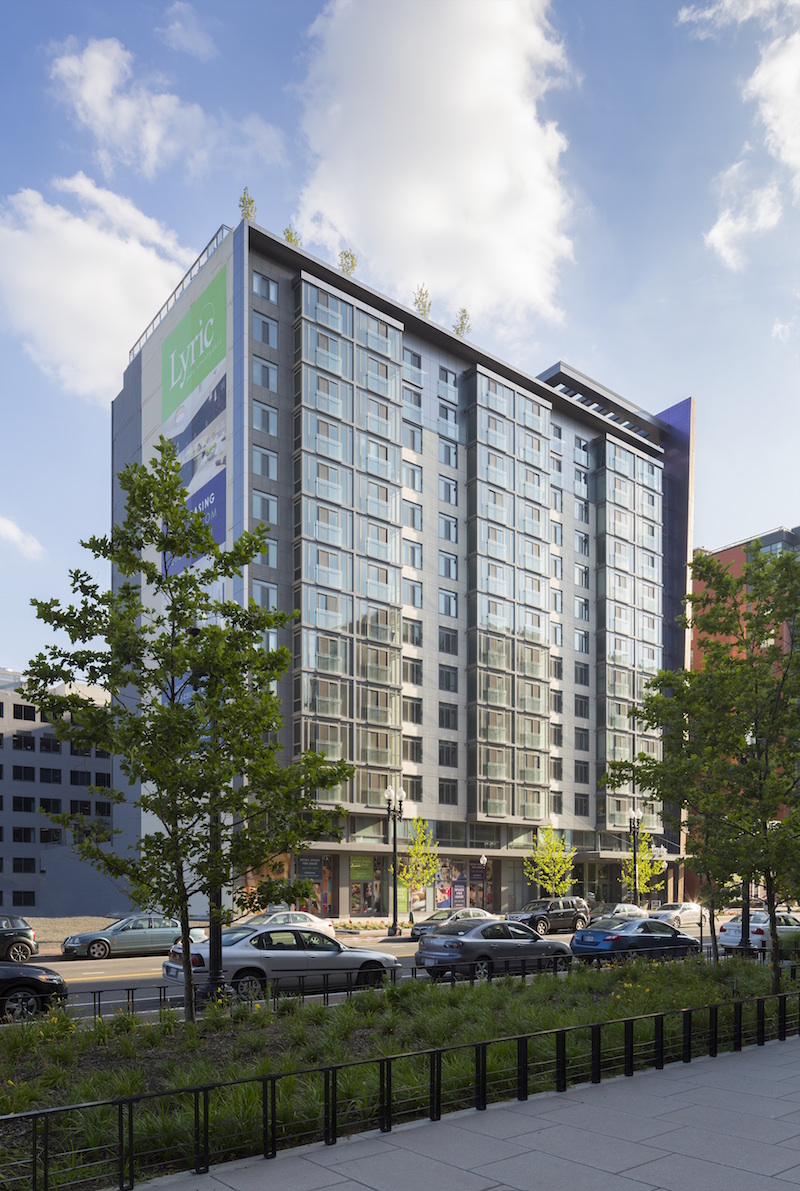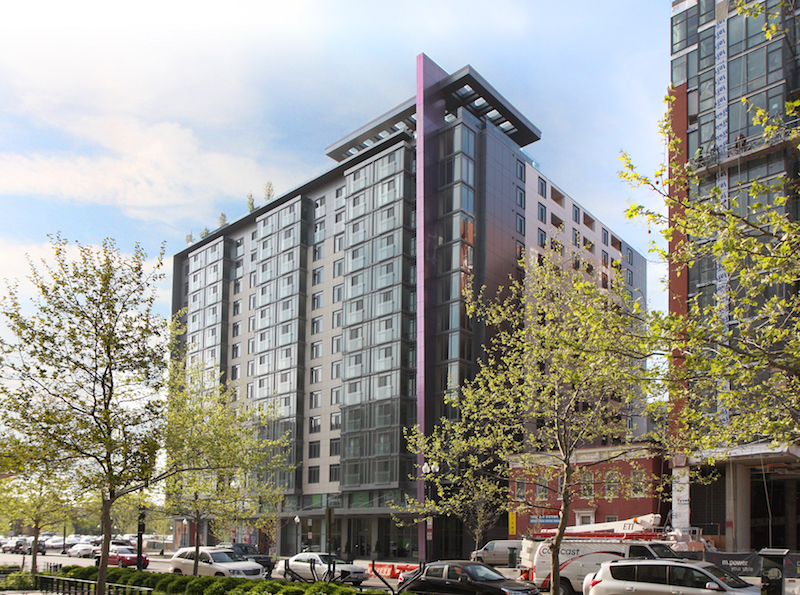When describing the architectural styles of Washington, D.C., progressive is not a term most would associate with buildings in the nation’s capital. But over the last decade, the Mount Vernon Triangle ─ located east of the Washington Convention Center─ has experienced a transition from exclusive industrial and commercial activity to a “walkable” neighborhood of businesses interspersed with new and historic residences.
In the heart of this community stands a prime example of innovation in architecture for the metropolitan area: the Lyric 440K Apartments, a 14-story structure with 234 one-and two-bedroom units.
Quadrangle Development Corporation oversaw the Lyric 440K’s design and construction with Davis Carter Scott (DCS) Design. In searching for alternatives to expensive porcelain tile to achieve the look envisioned for the project, they turned to ALPOLIC® because of the company’s reputation for high quality and exceptional service. The option to use fire-resistant aluminum cladding materials in the building’s envelope in an exceptional array of finishes inspired the design team to achieve their desired results without the added costs.

That inspiration finds its signature expression in a huge “fin” that gives the Lyric 440K building its focal point. The most striking thing about the “fin” is its color, a custom color variation of the Prismatic Finish named DragonFly. As with all ALPOLIC® Prismatic finishes, this particular color gives the illusion of changing color, contingent on point of view and the angle of light on the surface. Depending on where one looks, one can see shades of purple, teal, orange, and even pink.
In addition to the “fin,” the building incorporates ALPOLIC® materials in BNT Bone White and MFS Mica Silver, providing a unique combination of colors that stand out. All of these finishes are made possible by the unrivaled color, brightness and gloss range available with Lumiflon® FEVE fluoropolymer resin and Valflon® coatings supplied by Valspar®.
ALPOLIC® not only proved to enhance the outward appearance of the Lyric 440K building, but also provided flexibility in the overall design, in particular where waterproofing and thermal control were concerned. Materials were easily applied to an otherwise complex and detailed design.
The Lyric 440K is one building in Washington, D.C. that honors tradition in architectural style while looking proudly forward to a new way.
Related Stories
| Aug 11, 2010
9 rooftop photovoltaic installation tips
The popularity of rooftop photovoltaic (PV) panels has exploded during the past decade as Building Teams look to maximize building energy efficiency, implement renewable energy measures, and achieve green building certification for their projects. However, installing rooftop PV systems—rack-mounted, roof-bearing, or fully integrated systems—requires careful consideration to avoid damaging the roof system.
| Aug 11, 2010
Pella introduces BIM models for windows and doors
Pella Corporation now offers three-dimensional (3D) window and door models for use in Building Information Modeling (BIM) projects by architects, designers, and others looking for aesthetically correct, easy-to-use, data-rich 3D drawings.
| Aug 11, 2010
AAMA developing product-based green certification program for fenestration
The American Architectural Manufacturers Association is working on a product-based green certification program for residential and commercial fenestration, the organization announced today. AAMA will use the results of a recent green building survey to help shape the program. Among the survey's findings: 77% of respondents reported a green certification program for fenestration would benefit the product selection process for their company.
| Aug 11, 2010
Seven tips for specifying and designing with insulated metal wall panels
Insulated metal panels, or IMPs, have been a popular exterior wall cladding choice for more than 30 years. These sandwich panels are composed of liquid insulating foam, such as polyurethane, injected between two aluminum or steel metal face panels to form a solid, monolithic unit. The result is a lightweight, highly insulated (R-14 to R-30, depending on the thickness of the panel) exterior clad...
| Aug 11, 2010
AIA Course: Enclosure strategies for better buildings
Sustainability and energy efficiency depend not only on the overall design but also on the building's enclosure system. Whether it's via better air-infiltration control, thermal insulation, and moisture control, or more advanced strategies such as active façades with automated shading and venting or novel enclosure types such as double walls, Building Teams are delivering more efficient, better performing, and healthier building enclosures.







